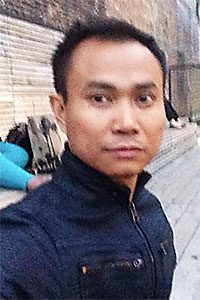
When building a house, hiring a contractor whose credentials are more about demolishing structures than building new ones could turn into a nightmare. You could hardly blame such an inexperienced contractor if your house collapsed.
The Thai people's reliance on the current regime to restore democracy is just as haunting. Its most notable achievement so far has been killing democracy by catapulting itself to power through the 2014 coup. It now aspires to bury democratic principles out of sight and "build" a kind of Thai-style democracy.
During a mobile cabinet meeting in Loei on Monday, Prime Minister Prayut Chan-o-cha told people there that the military, police and other authorities are working hard to build and strengthen democracy and prevent it from collapsing.

Surasak Glahan is Deputy Editorial Pages Editor, Bangkok Post.
It was hardly a surprise when no one fired back at him a question along the lines of: So why did you destroy it in the first place?
Amid the current climate of fear and state-led intimidation, few would dare to raise such a pointed but useful question directly with the premier.
Yet while Gen Prayut has vowed to "build" democracy, he and his regime have done everything to prevent its key principles from settling as a much-needed foundation.
Freedom of expression remains highly restricted; criminal lawsuits have been slapped against those who dared to speak up against repression; and soldiers and local leaders closely watch the movement of local people in various provinces.
The National Council for Peace and order (NCPO) promised a general election would take place early next year -- with Feb 24 given as a tentative date -- but it refuses to return to basic democratic principles by only partially lifting its longheld ban on political activities.
The climate of fear is a stark reminder of the repressive environment we saw in the lead-up to the August 2016 constitutional referendum. In the months prior to the vote, authorities banned people from campaigning against the draft charter. At the same time, it did a poor job of orientating people about the content of the charter. As a result, not all of the electorate were well-informed about it.
And when campaigners and some politicians tried to do their job to explain the content of the draft charter, they got into trouble. Many faced criminal lawsuits for violating the NCPO's order.
Such intimidation has made many people question the legitimacy of the referendum that approved the constitution. Similarly, the free and fair nature of the upcoming election is likely to be debated unless the regime starts doing what it should do and stops doing what it shouldn't.
That means the NCPO should not have to wait until mid-December to fully lift the political ban.
There is no need to forbid political parties from using social media for campaigning, or even communicating with the electorate. If the regime is worried voters will be hit with false or "distorted" information spread by politicians, it should be aware that allowing communication on social media helps them to learn about, scrutinise and debate the policy platforms of political parties in advance. This is a good thing for democracy.
Worse still, its legal tactics against certain political parties, if they are to be further pursued, will also prompt questions about the legitimacy of the poll given that Gen Prayut's political ambition to retain his grip on power is becoming ever more obvious.
On Monday, police filed computer crime charges against three executives of the Future Forward Party who criticised the regime on Facebook in June.
While parties are still banned from campaigning on social media, state propaganda about the government's "achievements" has been amplified by the regime's public relations spinners.
In addition to the mobile cabinet trips, soldiers have met and greeted people on the ground, especially those in the North and Northeast, political strongholds of the Pheu Thai Party, to "improve people's attitudes".
But the troops have done more than just serve as messengers. Some have knocked on the doors of local red-shirt supporters, warning them not to join in any political activities.
Gen Prayut and his deputy, Gen Prawit Wongsuwon, also instructed local leaders, village heads and sub-district chiefs on Monday to keep peace and order in their localities for the poll. They are being positioned as the eyes and ears of the government.
Both Gen Prayut and Gen Prawit painted a picture of violence marring the poll but this has proven to be quite rare in Thailand (the demonstrations led by the People's Democratic Reform Committee in February 2014 being a notable exception). Now that one of the three protest leaders has been rewarded with a job in the government, the regime can contain the possibility of such violence more easily.
If Gen Prayut intends to build a strong democracy he should let core elements of the system function again. He can't build a democracy by removing its foundations. That's like building a house just to watch it collapse.
